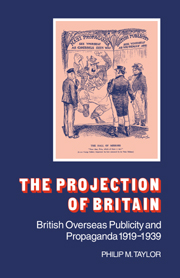Book contents
- Frontmatter
- Contents
- Preface
- Acknowledgements
- Abbreviations
- Introduction
- Part One Publicity and diplomacy, 1919–1939
- 1 The Foreign Office and the press
- 2 The Foreign Office and propaganda abroad
- Part Two The projection of Britain, 1919–1939
- Part Three Psychological rearmament, 1935–1939
- Conclusion
- Notes
- Select bibliography
- Index
2 - The Foreign Office and propaganda abroad
Published online by Cambridge University Press: 01 October 2009
- Frontmatter
- Contents
- Preface
- Acknowledgements
- Abbreviations
- Introduction
- Part One Publicity and diplomacy, 1919–1939
- 1 The Foreign Office and the press
- 2 The Foreign Office and propaganda abroad
- Part Two The projection of Britain, 1919–1939
- Part Three Psychological rearmament, 1935–1939
- Conclusion
- Notes
- Select bibliography
- Index
Summary
Although the exact nature of the contribution made by British propaganda towards the achievement of victory in 1918 must necessarily remain the subject of historical debate, the value of propaganda as an effective instrument of warfare was nonetheless widely appreciated by contemporaries. Regardless of whether the reputation for success either in helping to attract the United States into the war on the Allied side or in bringing the Central Powers to their knees is an undeserved myth or an undervalued reality, the fact remains that many people believed (or chose to believe) that these decisive events were not unrelated to the British government's skilful employment of propaganda between 1914 and 1918. There was, after all, much profit to be made from praising the work of Wellington House or that of Crewe House. In the United States, for example, the belief that the American people had somehow been duped into involvement in 1917 by propaganda merely served to reinforce the arguments of those isolationists who advocated withdrawal from the devious machinations of the Old World. And in Germany, the testimonies of prominent enemy personalities such as Hindenburg and Ludendorff (‘we were hypnotised by the enemy propaganda as a rabbit by a snake’) were seized upon by Adolf Hitler to perpetuate the legend that the German army had not been defeated on the field of battle but had been betrayed from within following the collapse of morale at home caused by Lord Northcliffe's propaganda from Crewe House. Northcliffe was himself more modest about his achievement, being content merely to claim: ‘We have to some extent hastened the end.’
The British propaganda experiment had certainly proved an impressive lesson in improvisation.
- Type
- Chapter
- Information
- The Projection of BritainBritish Overseas Publicity and Propaganda 1919–1939, pp. 44 - 80Publisher: Cambridge University PressPrint publication year: 1981

